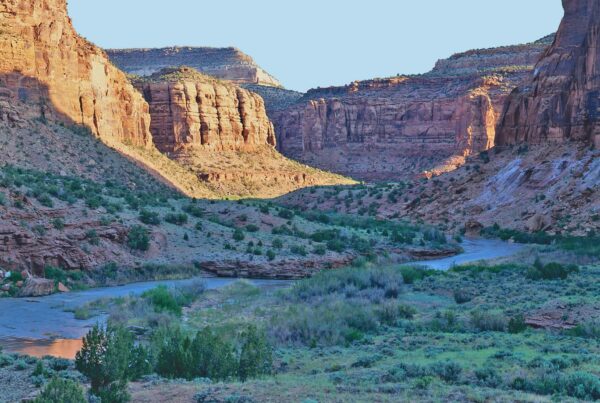TAKE ACTION: COMMENT ON COLORADO'S WOLF MANAGEMENT PLAN
The comment window for this action alert has closed.
Thanks for your interest! To stay involved and receive updates, please sign up for our emails.
Take Action: Comment on Colorado's Wolf Management Plan!
Colorado Parks and Wildlife (CPW) is now taking public comment on their Draft Colorado Wolf Restoration and Management Plan. They are accepting comments until February 22nd, 2023.
BACKSTORY
Wolf advocates worked for decades to get the Colorado Division of Wildlife and its successor, Colorado Parks and Wildlife, to reintroduce the native gray wolf to Colorado with no result. Advocates succeeded in getting a ballot initiative on the 2020 Colorado ballot requiring reintroduction. The initiative passed, and it requires that CPW begin reintroductions by the end of 2023. The Colorado Parks and Wildlife Commission will approve a final plan in May of this year to guide the restoration process.
WHY DO WE NEED TO REINTRODUCE WOLVES?
Wolves are a native species that was extirpated from the state mainly to prevent losses to livestock. Scientists have learned about the necessity of having large predators in our ecosystems, and wolves have demonstrated that value in other areas where they’ve been reintroduced. And it’s the right thing to do.
THE PROCESS
After passage of the ballot initiative, CPW created 2 advisory groups to give recommendations on what should be included in the plan. The Technical Working Group (TWG) was composed of wolf biologists from across the West, and the Stakeholder Advisory Group (SAG) included 17 members with different perspectives on wolf restoration, including wolf advocates, ranchers, and hunters. Both groups gave their final recommendations to CPW in August of 2022, and CPW used those recommendations as the basis of the draft plan that was made public on December 9, 2022. They are now in the process of taking written comments and holding public meetings to take input on the plan.
Here’s the meeting schedule; to comment at the meetings you must be present, except to the February 16 virtual meeting.
- January 19, 2023 – Colorado Springs – 8:00 am – 2:00 pm
- January 25, 2023 – Gunnison – 8:00 am – 4:00 pm
- February 7, 2023 – Rifle – 8:00 am – 4:00 pm
- February 16, 2023 – Virtual via Zoom – 5:30 pm – 8:30 pm
- February 22, 2023 – Denver – 8:00 am – 3:00 pm
More meeting info is at: CPW Wolf Restoration and Management Plan: Finalization and Public Engagement (state.co.us)
HOW TO COMMENT
CPW is accepting feedback until February 22nd. Use the portal below to comment.
Please personalize your comments. We encourage folks to reference their own experiences and personal concerns. For reference, we have a sample comment below. Feel free to edit this as you see fit.
YOU CANNOT COMMENT ON THIS PAGE.
KEY POINTS TO MAKE:
- Recreational Hunting (“Phase 4”)
- The voters defined the wolf as a nongame species
- The SAG recommended that no decision about Phase 4 be included in the plan
- Delisting criteria from Phase 2 (state threatened) to Phase 3 (nongame)
- Revise delisting numbers upward based on best available science
- Conservation biology guidelines suggest 100 breeding individuals (50 breeding pairs) to avoid inbreeding
- Add a geographic component to delisting criteria
- Conservation science is clear that geographic distribution is an important part of recovery. A species should be present in as much of its suitable range as possible
- 200 wolves (the delisting standard) could occupy as little as 8% of available habitat
- Revise delisting numbers upward based on best available science
- Nonlethal conflict prevention methods should be explored and encouraged before lethal; lethal methods should not generally be a first line of defense
- In Impact: Ungulate populations, lethal control should only be considered if prey species are not only below objectives but also undergoing an unacceptably severe decline; and causality is clear
- Expand the discussion of a Conflict Prevention Program
- Conflict prevention receives less than one page of discussion (p. 50), it should be expanded and recognize the opportunities to work with non-profit groups to implement methods
- Describe the many available techniques for conflict reduction/ prevention
- Modify Compensation Program guidelines
- The draft compensation plan is much more generous than intended in Prop 114
- Incentives should promote prevention before compensation for livestock losses
- Expand the discussion of positive impacts of wolves
- The plan should recognize the requirement in state law that wolf management be supported by the general fund and not revenues from hunting licenses
SAMPLE COMMENT (Please personalize!)
Colorado can create a model wolf management plan, and the current draft is a major step in that direction. I do have some concerns about the draft, and suggest the following changes, to meet the intent of the voters of Colorado in passage of Proposition 114.
All references to recreational hunting (Phase 4) should be removed from the plan, as Proposition 114 clearly defines the wolf as a nongame animal, and the Stakeholder Advisory Group recommended that no decision about Phase 4 be included in the plan
The number of wolves required for delisting from state threatened to nongame should be increased, based on updated biological information. Conservation biology guidelines suggest that a minimum of 100 breeding individuals (50 breeding pairs) is needed for a self-sustaining population.
Distribution goals must be included in the plan. It’s not enough to have a minimum number of wolves in Colorado, they should occupy as much of the suitable habitat in the state as possible. The delisting number of 200 could occupy as little as 8% of Colorado’s suitable wolf habitat, that low percentage would be unacceptable for any other species.
CPW should require that wolves occupy as much of their habitat in Colorado as possible. To ensure that, there should be geographic requirements for delisting, such as requiring wolves to be present in multiple locations across the western slope.
Prevention of conflict with livestock is the best approach to helping ensure that Colorado’s wolf restoration moves forward as smoothly as possible. CPW must promote and incentivize prevention, and consider methods to require the use of provided materials and methods before compensation is provided, such as is done with other predators and deer and elk damage prevention. The discussion of prevention in the plan should be substantially expanded to better describe the available techniques and how they might be applied in different situations.
Any decision to remove wolves from an area due to negative impacts on other species must be based on solid proof that wolves are the primary cause of the problem. So many factors affect wildlife populations that any determination that wolves are the problem must be clear and conclusive. It should also be noted that many wolf advocacy organizations and Colorado State University are actively developing funding and technical support for producers who want to implement prevention methods.
The compensation program, as described, is the most liberal in the western United States. As wolves are a native predator, they should be viewed as a part of doing business, particularly on our public lands. CPW’s existing compensation program for bear and mountain lion depredation should be used as a guide for a wolf compensation program.
The positive impacts of wolves, from changing behavior of prey in a way that prevents overuse of habitat to the potential for the formation of wolf watching businesses should be described.
Lastly, the plan should clearly explain that state law (House Bill 21-1243) requires that wolf management be funded through legislative appropriations, and not funded from revenues generated from hunting license fees.
TAKE ACTION: PROTECT GREATER CHACO
The comment window for this action alert has closed.
Thanks for your interest! To stay involved and receive updates, please sign up for our emails.




